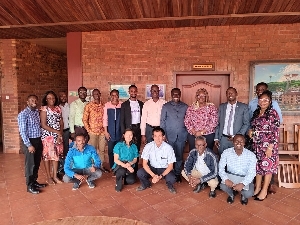 The workshop provided insights into Ghana's implementation of the PTPDM policy
The workshop provided insights into Ghana's implementation of the PTPDM policy
A recent working visit by a delegation from the Ministry of Education, Ethiopia saw engaging discussions with the National Teaching Council and Ghana Education Service on the Pre-tertiary Teacher Professional Development and Management Policy (PTPDM).
Organized by the Japanese International Cooperation Agency (JICA) on March 11, 2024, at the Coconut Grove Regency Hotel in Accra, the experience-sharing workshop provided valuable insights into Ghana's implementation of the PTPDM policy, its achievements, and challenges encountered.
Taddesse Teresa, the Science, Technology, Engineering, Arts, and Mathematics (STEAM) desk head of the Ministry of Education, Ethiopia, expressed eagerness to learn from Ghana's experiences and incorporate best practices into Ethiopian initiatives. The Ethiopian delegation included Aseged Miressa, Kindinew Tegared, Getachew Debela, and Lidia Sante.
Also present at the event were Junko Nakasawa, Oshima Akira, and Miyata Shunya, representing JICA, along with representatives from the National Teaching Council and Ghana Education Service led by Lawrence Sarpong and Angela Nkansah, respectively.
During the session, Aseged Miressa highlighted Ethiopia's teacher supply system and challenges in pre-service training, emphasising the need for alignment with the curriculum and practical skills development. She outlined key reform areas prioritised by Ethiopia to reshape the education system, focusing on workforce management, teacher licensing, pre-service training, in-service training, and motivation of teachers.
Lawrence Sarpong, the Deputy Registrar in charge of operations at the National Teaching Council, briefed the delegates on the Council's regulatory mandate as outlined in the Education Regulatory Bodies Act, Act 1023, and Ghana's commitment to professionalising the teaching profession, including adherence to Africa Federation of Teaching Regulatory Authorities (AFTRA) and International Forum of Teacher Regulatory Authorities (IFTRA) policies.
He showcased the Council's innovative teacher portal system, which facilitates license verification and maintains a digital register of certified teachers.
Mr. Sarpong also enumerated how Ghana's teacher licensing and professional development efforts have elevated Ghanaian teachers internationally. This recognition led to Ghana's inclusion in the UK government's list of countries for teacher recruitment. Furthermore, representatives from Sierra Leone, Zambia, and South Africa have visited Ghana to gain insights into the operations of the Council.
David Abeiku Fynn from the Ghana Education Service (GES) outlined changes in promotion, recruitment processes, and staff appraisal systems aligned with the PTPDM policy.
Angela Frimpongmaa Nkansah, the Director of the Human Resource Management Division of GES, highlighted the significance of the Human Resource Management Information System (HRMIS).
The system, she said, hosts data including teachers' full names, ranks, gender, staff ID, current school placements, gross salaries, net salaries, and all relevant deductions, streamlining personnel management processes within the education sector.
The meeting served as a platform for exploring collaborative opportunities between Ghana and Ethiopia in teacher professionalisation, fostering knowledge exchange and capacity-building initiatives. Delegates discussed tangible outcomes from the PTPDM policy.
As the meeting concluded, it became clear that the exchange between Ghana and Ethiopia holds promise for advancing teacher professionalisation and improving educational outcomes in both countries.